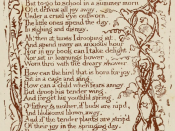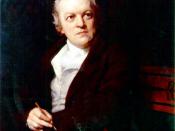Analysis of a William Blake Poem: áçThe School Boyáè I believe that William Blakeáæs poem, áçThe School Boyáè, shows the joys of Nature and how Man is naturally happy when immersed in Nature, and not removed from it (as is the case when the boy is in school). The school boy áçloves to rise in a summer morn/ When the birds sing on every treeáè (283, 1-2), yet áçto go to school in a summer morn/ O! it drives all joy awayáè (283, 3). Nature makes the boy happy yet the societal convention of school makes the boy sad. Likewise, the cage a bird is placed in mirrors the boyáæs feelings and opinions of school. The boy feels caged and identifies with the bird in the cage. Blake writes, áçHow can the bird that is born for joy,/ Sit in a cage and sing./ How can a child when fears annoy,/ But droop his tender wing/ And forget his youthful springáè (283, 15-20).
This passage seems the most relevant for me in the boysáæs connection to Nature. The boy questions how the bird can sing since it is áçborn for joyáè. Thus, the boy believes that the bird is not happy in the cage just like he is not content in school. What is also important to note is that the boyáæs shoulders are described as wings that droop, envoking the image of a sad bird. The boy deeply identifies with the bird and also Nature.
Another example of the boyáæs identification with Nature is given in the last lines of the poem. Blake writes, áçHow shall the summer rise in joy/ Or the summer fruits appear/ Or how shall we gather what griefs destroy/ Or bless the mellowing year,/ When the blasts of winter appearáè (283, 25-30). Here, even Nature who is joyous will have griefs when Winter comes. In this poem, Blake demonstrates the school boyáæs identification with Nature, in that Nature gives him joy and symbolizes joy for him. Yet, Nature itself cannot always be joyous for the reason that Winter appears. Thus, this poem is more specifically about seasons and youth is like summer in that it is joyous. Yet Winter takes away joy just like school takes away from the boyáæs youth. To restate this idea in Blakeáæs words: áçHow can a child when fears annoy/ But droop his tender wing,/ And forget his youthful springáè (283, 18-20).





